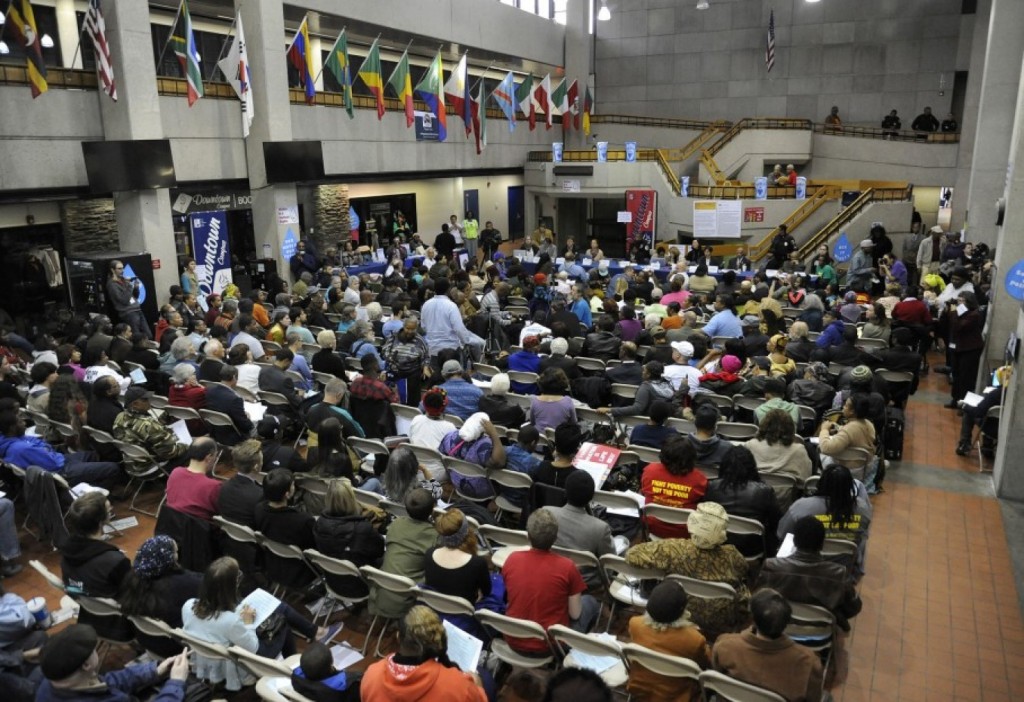UN Officials “Shocked” by Detroit’s Continuing Water Shut-offs
Oct 26, 2014
Posted in Equal Rights/Equity, Gentrification, Health, Housing/Foreclosures, Politics, Responsive Government

By Post Staff and news reports
Two United Nations rapporteurs who visited Detroit, Michigan on an informal fact-finding mission this recently were “shocked” to learn that city has shut-off water to at least 27,000 households this year, with as many as10,000 currently without running water.
Hundreds of thousands of additional households are at risk of having their water turned off.
“We were shocked, impressed by the proportions of the disconnections and by the way that it is affecting the weakest, the poorest and the most vulnerable,” said Catarina de Albuquerque, the U.N. special rapporteur on the human right to safe drinking water and sanitation, at a press conference in Detroit on Monday last week.
“I’ve been to rich countries like Japan and Slovenia where basically 99 percent of population have access to water, and I’ve been to poor countries where half the population doesn’t have access to water … but this large-scale retrogression or backwards steps is new for me,” she said.

“From a human rights perspective, any retrogression should be seen as a human right violation,” she added. “I heard testimonies from poor, African American residents of Detroit who were forced to make impossible choices – to pay the water bill or to pay their rent.”
Rapporteur de Albuquerque and Leilani Farha, U.N., special rapporteur on adequate housing, went to Detroit Oct. 18 to look the Detroit Water and Sewerage Department’s water shut-offs.
Contractors are proceeding from block to block turning off the water of households that are behind in their monthly bill. Monthly bills have risen by 119 percent in the last decade.
When a contractor reached the block where Charity Hicks lives, Hicks – who a community leader in the fight against the shutoffs – demanded, “Where’s your water termination notice?”

nstead of answering, the contractor drove away, knocking Hicks over and injuring her leg. Soon two policemen soon arrived – to arrest her. Mocking her questioning the water shut-offs, they took Hicks, who is pregnant, to jail, where she spent two days before being released without charges.
A lawsuit was filed on behalf of residents who have had their water turned off. But in late September, Detroit’s bankruptcy judge ruled that, although “water is a necessary ingredient to sustaining life,” residents nevertheless have no “enforceable right” to water and that the city needed the revenue.
A number of residents reported to the UN fact-finders that they fear they will lose custody rights because having no running water is grounds for the city’s child protective services to remove their children.
According to one news report, Theresa Clayton, a third-grade teacher in the Detroit public school system, said she is required to report students without water to child protective services. “I have had to train my children, [saying to them]: ‘If you do not have water, you cannot tell me … because the people will come get you,” Clayton said.
At a town hall meeting a week ago on Sunday, a school board member said that one high school principal has begun to open the school at five a.m. so that the students could shower and wash their clothes.
The Detroit mayor’s office criticized the U.N. review as one-sided. Alexis Wiley, Mayor Mike Duggan’s top aide, said the city is “very disappointed” with them.
“They weren’t interested in the facts,” she said. “They took a position and never once [before Monday] reached out to the city for data.”
The city policy is to shut off water to businesses and residents who either are 60 days past due or owe more than $150.
Detroit is country’s largest municipality to file for bankruptcy. Most shut-offs were halted for several weeks this summer to give residents an opportunity to enter a payment plan, but they have resumed with 5,100 shut-offs in September alone.